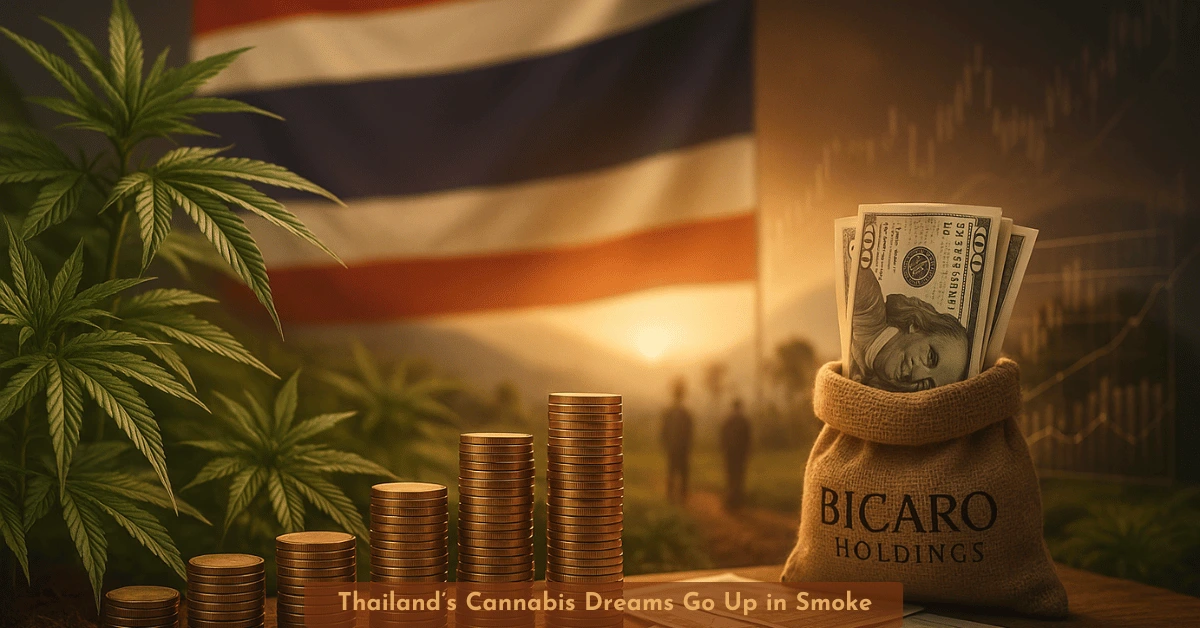Thailand’s bold experiment with legal cannabis has hit a major roadblock. Three years after decriminalizing the plant in 2022, the Ministry of Public Health has moved to reinstate strict controls—banning sales without a doctor’s prescription and reclassifying cannabis buds as a controlled herb. This change has sent shockwaves through the industry, from small farmers in Nakhon Ratchasima to urban dispensaries in Khon Kaen.
Small Farms in Crisis
In the fertile plains of Nakhon Ratchasima, farmer Somkiat Nitiketkosol tends his plot at Suan Fah Yim. He watched prices for cannabis flowers collapse from 500–700 baht per gram to under 100 baht, as a flood of foreign investors and under-regulated retailers swamped the market. Now, with new rules requiring costly GACP certification—a step up from the previous GAP standard—small- and medium-sized farms like his face overwhelming compliance costs and paperwork delays.
“We feel trapped,” Somkiat says. “Upgrading to GACP costs hundreds of thousands of baht and months of waiting. Many of us simply cannot afford it.”

Montri Yiamsungnoen, head of the Korat Loves Cannabis network of over 450 farmers and entrepreneurs, echoes the concern. His group plowed more than 10 million baht into greenhouses now repurposed for vegetables. With over 100 kg of dried flowers unsold since December, Montri warns that without fair compensation or clearer guidelines, many farms will shut down.

Political Upheaval and Policy Reversal
The policy U-turn comes amid political turmoil. The pro-legalization Bhumjaithai Party left the ruling coalition after tensions with the Pheu Thai Party, which has campaigned on tighter cannabis controls. Health Minister Somsak Thepsutin’s new order—set to take effect upon Royal Gazette publication—aims to curb youth access and crack down on unlicensed sellers. He has even floated reclassifying cannabis as a narcotic within 45 days, a move that could further squeeze legitimate operators.
Government spokesperson Jirayu Houngsab defended the decision: “Cannabis shops have proliferated, serving both medical and recreational users. Easy access for children contradicts our goal of responsible regulation.” Yet critics call the shift politically motivated and warn it could drive the industry back underground.
Dispensaries Prepare for Change
In Khon Kaen, dispensary owner Phachara Thaisa of Weed Station sees both risk and opportunity. He plans to hire medical staff to meet the new prescription-only requirement and limit customer purchases to 1 gram per day or 30 grams per month.
“Sales may dip, but quality and legitimacy will rise,” Phachara says. “We’ll charge fair prices and rebuild consumer trust—if the government supports us with clear guidelines.”
Dr. Thanakrit Jitareerat, assistant public health minister, confirmed that unprescribed cannabis sales will be punishable by fines or jail time. Only licensed physicians and pharmacists may now authorize cannabis, aiming to protect youth and public health.
Calls for Clear, Balanced Regulation
Industry leaders urge the government to pair stricter controls with robust support for legal operators. Wisan Potprasat, president of the Western Herbal Alliances network, argues that reclassifying cannabis as a narcotic would stifle research, extraction, and trials essential for medical progress.
“Tighter rules without alternatives will collapse the industry we’ve built,” Wisan warns. “We need clear laws and market support—not political games.”
Advocates like Daycha Siripatra, a traditional medical practitioner, allege that vested interests in alcohol and pharmaceuticals are influencing the crackdown. They plan protests at the Health Ministry, demanding regulations that balance public safety with sustainable industry growth.
What’s Next for Thailand’s Cannabis Sector?
Amid regulatory uncertainty, Thailand’s cannabis sector stands at a crossroads. For investors and operators, the new framework offers a chance to weed out bad actors and establish higher standards—if implemented fairly. Companies with GACP- and GMP-certified operations, transparent supply chains, and a focus on medical and wellness tourism are best positioned to thrive.
Bicaro Group, with its dual indoor–outdoor cultivation model, certified facilities, and pioneering Bicaroland wellness farm in Korat, is ready to adapt. By investing in rigorous compliance and engaging local communities, Bicaro Group aims to lead Thailand’s cannabis industry into a new era—one grounded in quality, safety, and sustainable growth.
“Cannabis can deliver medical, economic, and social benefits—but only if the rules are clear and fair,” says Somkiat. “Otherwise, we all lose.”
For expert guidance on navigating Thailand’s evolving cannabis regulations, contact Bicaro Group at calvin@bicarogroup.com.
Source: https://www.bangkokpost.com/thailand/general/3059036/cannabis-dreams-go-up-in-smoke

